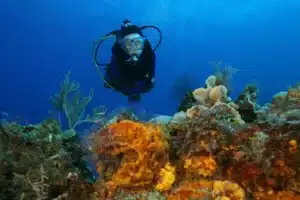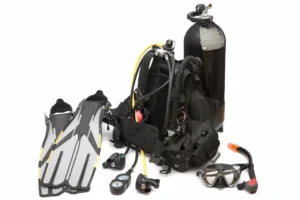Animals that feed primarily on plankton (freely drifting marine organisms) are called planktivores, a way of life that is very common among coral reef animals, including some fishes. Planktivorous coral reef fishes have evolved to become highly specialized feeders on the tiny zooplankton (animal plankton) that fortuitously drifts their way.
To gain access to the richest concentrations of incoming plankton before they are decimated by hosts of sedentary coral reef animals (including the corals themselves), planktivorous coral reef fishes must distance themselves somewhat from the immediate shelter of the reef (see photo; right) and venture into open waters where swift predators like sharks, jacks, and barracudas hunt. In such fishes, this way of life has shaped both their bodies and behaviors to the extent that such fishes are now quite different from related species that feed in other ways.
Adaptations
Many planktivorous coral reef fishes achieve a measure of protection from such threats by seeking safety in numbers, a traditional defense of open water fishes. Another useful adaptation in this context is speed, and most open water planktivores have acquired more sleek body shapes than those possessed by related species that feed close to the reef.
Open water planktivorous coral reef fishes have also evolved modified color patterns, and are often cloaked in countershaded (darker on top, lighter on bottom) blues or silvers, color patterns that reduce their ease of visual detection by predators in well lit open waters.
The open water plankton feeding “fraternity” of coral reef fishes consists of a hodgepodge of distantly related groups, including most notably a collection of specialized damselfishes, wrasses, and snappers. A particularly notable example of such specialization is the damselfish genus Chromis, different species of which are among the most numerous of planktivores on coral reefs of both the Greater Caribbean and Indo-Pacific regions.
A diverse group of other fishes feed on plankton close to the reef or other nearby benthic habitats, places where the plankton has already been somewhat diluted by other animals, but the safety of the reef is close at hand.
The Night Shift
Opportunities to feed are seldom wasted in coral reef communities, and open water plankton feeding is no exception. The “day shift” of planktivorous coral reef fishes takes shelter within the reef as night falls, and are soon replaced by a “night shift” consisting of a very different set of species with adaptations appropriate to low light conditions.
Among the most common of such adaptations are very large eyes particularly adapted for night vision, and reddish coloration, which appears almost black under minimal light. These same adaptations are common in many deep sea animals.
The masters of this feeding strategy are mainly the small cardinalfishes (Apogonidae) and larger squirrel fishes (Holocentridae, pictured left). The cardinalfishes in particular are often present in very large numbers on the reef by day, but are seldom seen at that time because they remain sheltered deep within reef cavities and crevices.
Readers interested in more information on planktivorous coral reef fishes are referred to our “Additional Resources” section, which contains a list of recommended books on coral reef fishes.
Coral Reef Fishes | Planktivorous Coral Reef Fishes | Herbivorous Coral Reef Fishes | Benthic Carnivores | Piscivorous Coral Reef Fishes



